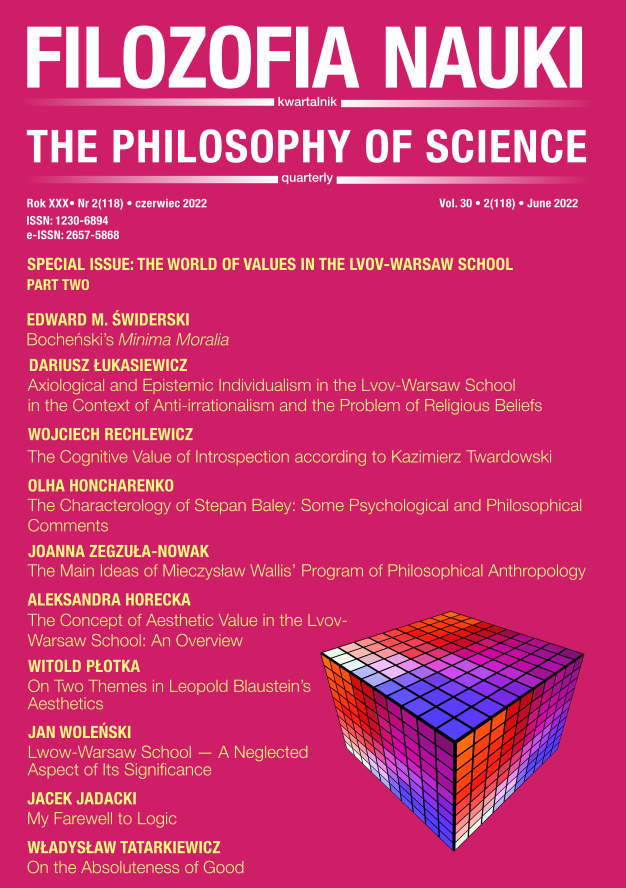The Characterology of Stepan Baley: Some Psychological and Philosophical Comments
DOI:
https://doi.org/10.14394/filnau.2022.0018Słowa kluczowe:
Stepan Baley, Lviv-Warsaw School, Kazimierz Twardowski, character, empirical research, psychology of morality, situationismAbstrakt
This article aims at identifying the relevance of character research, conducted by Stepan Baley, a representative of the Ukrainian branch of the Lviv-Warsaw School. To achieve this, the author first analyzes the key points of Baley’s characterology, and then demonstrates its potential from the perspective of Twardowski’s philosophical tradition and within the ethical debate on the empirical approach to character. The author concludes that it is impossible, according to Baley, to obtain accurate and complete knowledge of character, as well as it is impossible to educate a person in a certain way.
Bibliografia
Athanassoulis N. (2000), “A Response to Harman: Virtue Ethics and Character Traits,” Proceedings of the Aristotelian Society 100, 215-221. https://doi.org/10.1111/1467-9264.00076
Baley S. (1933a), “Charakter normalny,” Rocznik Psychiatryczny 20, 75-86.
Baley S. (1933b), Charakterologia i typologia dzieci i młodzieży, Warszawa: Nasza Księgarnia.
Baley S. (2002), “Psychology of Character” [in:] Collected works, Lviv-Odesa: Cogito, vol. 1, 426-434 [in Ukrainian].
Baley S. (2016a), “Badania nad etyką i estetyką dzieci w wieku przedszkolnym” [in:] Wybrane pisma psychologiczne, S. Ivanyk, M. Lewicka (eds.), Warszawa: Wydawnictwa Uniwersytetu Warszawskiego, vol. 2, 262-352.
Baley S. (2016b), Badania nad społecznym zachowaniem się dzieci przedszkolnych [in:] Wybrane pisma psychologiczne, S. Ivanyk, M. Lewicka (eds.), Warszawa: Wydawnictwa Uniwersytetu Warszawskiego, vol. 2, 249-261.
Chutorański M. (2017), “Kolektyw edukacyjny 2.0. Między inspiracjami lekturą prac Makarenki a Latourem,” Problemy Wczesnej Edukacji 39(4), 22-30. https://doi.org/10.26881/pwe.2017.39.02
Doris J. M. (2002), Lack of Character: Personality and Moral Behaviour, Cambridge: Cambridge University Press. https://doi.org/10.1017/CBO9781139878364
Doris J. M., Stich S. P. (2005), “As a Matter of Fact: Empirical Perspectives on Ethics” [in:] The Oxford Handbook of Contemporary Philosophy, F. Jackson, M. Smith (eds.), Oxford: Oxford University Press.
Harman G. (1996), “Moral Relativism” [in:] Moral Relativism and Moral Objectivity, G. Harman, J. J. Thompson (eds.), Cambridge, MA: Blackwell Publishers, 3-64.
Harman G. (2000), “The Nonexistence of Character Traits,” Proceedings of the Aristotelian Society 100, 223-226. https://doi.org/10.1111/1467-9264.00077
Harman G. (2009), “Scepticism about Character Traits,” The Journal of Ethics 13(2-3), 235-242. https://doi.org/10.1007/s10892-009-9050-6
Kamtekar R. (2004), “Situationism and Virtue Ethics on the Content of Our Character,” Ethics 114(3), 458-491. https://doi.org/10.1086/381696
Kant I. (2012), Groundwork of the Metaphysic of Morals, Cambridge: Cambridge University Press.
Kauppinen A. (2013), “Ethics and Empirical Psychology: Critical Remarks to Empirically Informed Ethics” [in:] Empirically Informed Ethics, M. Christen (ed.), Cham: Springer, 279-305. https://doi.org/10.1007/978-3-319-01369-5_16
Mischel W. (2009), “From Personality and Assessment (1968) to Personality Science, 2009,” Journal of Research Personality 43, 282-290. https://doi.org/10.1016/j.jrp.2008.12.037
Rzepa T. (1997), Psychologia w szkole lwowsko-warszawskiej, Warszawa: Wydawnictwo Naukowe PWN.
Salii V. (2021), “The Problem of Collective Moral Responsibility: Qualitative Case Study of Anton Makarenko’s Collectivist Pedagogy,” Philosophy of Education 27(1), 124-140 [in Ukrainian]. https://doi.org/10.31874/2309-1606-2021-27-1-7
Twardowski K. (1901), Zasadnicze pojęcia dydaktyki i logiki do użytku w seminariach nauczycielskich i w nauce prywatnej, Lwów: Polskie Towarzystwo Pedagogiczne.
Twardowski K. (1999a), “Actions and Products” [in:] On Actions, Products and Other Topics in Philosophy, J. L. Brandl, J. Woleński (eds.), Amsterdam–Atlanta, GA: Rodopi, 103-132.
Twardowski K. (1999b), “On the Classification of Mental Phenomena” [in:] On Actions, Products and Other Topics in Philosophy, J. L. Brandl, J. Woleński (eds.), Amsterdam–Atlanta, GA: Rodopi, 65-72.
Twardowski K. (2013a), “Główne kierunki etyki naukowej” [in:] Myśl, mowa i czyn, A. Brożek, J. Jadacki (eds.), Kraków: Copernicus Center Press, vol. 1, 309-343.
Twardowski K. (2013b), “O zadaniach etyki naukowej” [in:] Myśl, mowa i czyn, A. Brożek, J. Jadacki (eds.), Kraków: Copernicus Center Press, vol. 1, 402-436.
Twardowski K. (2014a), “Does Man Always Behave Egoistically?” [in:] On Prejudices, Judgments, and Other Topics in Philosophy, A. Brożek, J. Jadacki (eds.), Amsterdam–New York: Rodopi, 323-328. https://doi.org/10.1163/9789401212045_021
Twardowski K. (2014b), “On the Notion of Education” [in:] On Prejudices, Judgments, and Other Topics in Philosophy, A. Brożek, J. Jadacki (eds.), Amsterdam–New York: Rodopi, 121-132. https://doi.org/10.1163/9789401212045



















 Filozofia Nauki | ISSN 1230-6894 | e-ISSN 2657-5868
Filozofia Nauki | ISSN 1230-6894 | e-ISSN 2657-5868